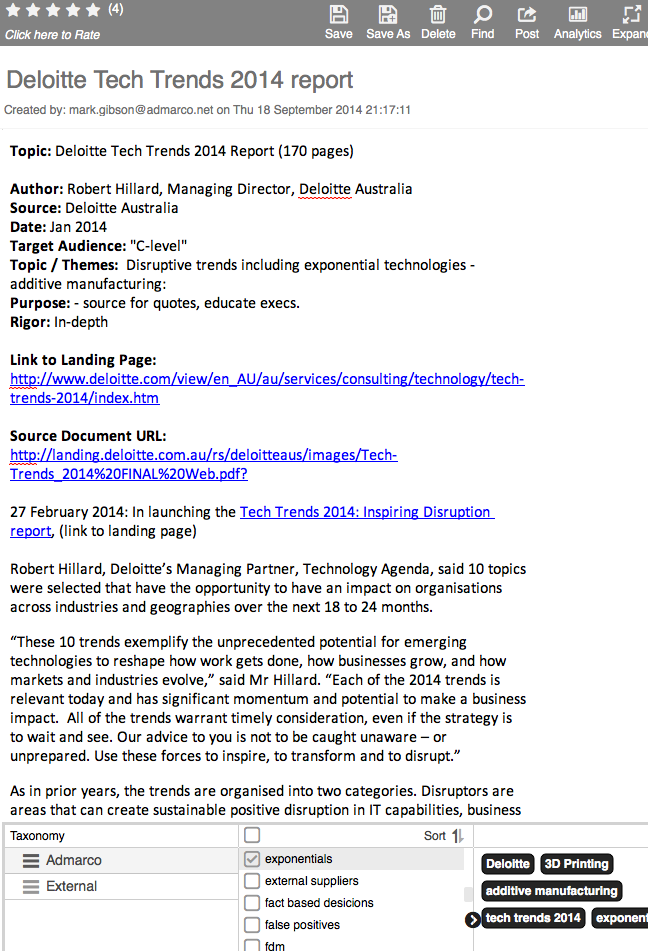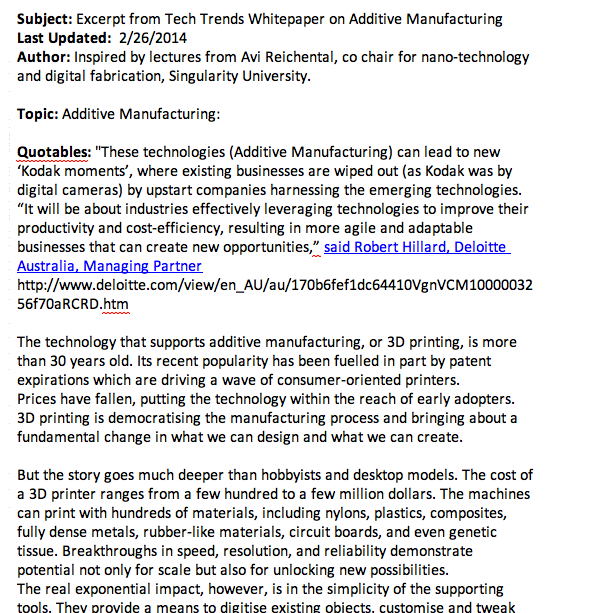Marketers and sales enablement professionals and salespeople who curate content to send to their clients should always give it a content header to create value for the receiver.
The following is a true story and a lesson learned.
Earlier this year I sent a link to a whitepaper to a new contact on LinkedIn. My contact, (Bill) is an important player in the target account and I felt that the whitepaper had useful insights that Bill would appreciate.
By sending it, he would understand my point of view a little better and after reading the article he would better understand how we could help him achieve his objectives… at least that was my line of thinking at the time.
It is big whitepaper, 170+ pages entitled Tech Trends 2014 and it was produced by Deloitte Australia. Lots of excellent articles and two that I found really aligned with my thinking on couple of disruptive technologies. Buried on P 149 there was an article of particular interest to Bill.
Here is an excerpt of the LinkedIn Inmail I sent to Bill.

But without context, or a reason for reading it and an excerpt of the relevant section, I was doing Bill a disservice. I sent Bill a piece of naked content.
Never Send Naked Content, Use Content Headers
How was Bill to know that buried inside this document there were gold-nuggets of information that he might find interesting and useful for his team in communicating a point of view to their customers?
By sending naked content I shifted the burden of creating context to Bill and asking him do a lot of unnecessary the work to figure out if it was relevant and useful. This is something that I should have done in a minute or two that would have made the article really useful, shareable and more valuable.
Let’s review what Bill (and the person receiving your content) has to do when my Inmail arrives.
- Scan it and understand what it is,
- Make a judgment call as to whether the sender has credibility,
- Make a judgment call as whether to click on the link… it could go anywhere, although in this case the full link describes the source and media,
- Read the whitepaper introduction and determine if it’s of interest,
- Find the index and scan it for interest areas,
- Download it, at 170 pages, it’s a weekend reading project,
- Find the time to navigate to the sections of interest and read them.
- Cut and paste excerpts of relevant sections and email to his team, with a content header.
This is a similar problem that salespeople and knowledge workers face when accessing documents in sales portals and Internet file stores. They don’t know what is in the document, or if it’s relevant, until they have downloaded and read it.
Content Headers Create Context and Value
I use the WittyParrot content delivery platform to index and store source content and to curate, share and deliver both structured documents and plain text content.
Here is a screenshot of the article in WittyParrot. I have included links to the landing page, the source document, an excerpt of the content with a content header and have tagged it so that it can be easily found.

This Wit is 1400 words and has multiple pieces of useful content aggregated within it.
I scrolled down the wit and took this screenshot of the relevant piece that I resent to Bill and for which he thanked me. I simply highlighted this section in WittyParrot and dragged it into the email I sent.

Summary
It takes a few minutes of effort to add a content header to a piece of content. Those few minutes will likely increase the value and the ROI of the content and the frequency of usage. By tagging it, it becomes accessible in a search using logical terms and by giving it a header we enable the viewer to quickly determine if the content is relevant.
If you believe that content is an important enabler of sales success, you are invited to find out more.



